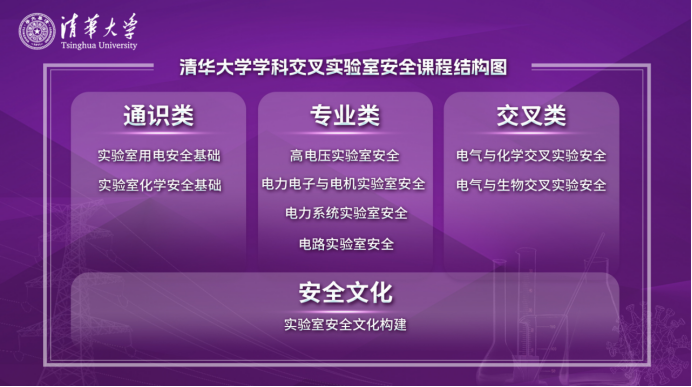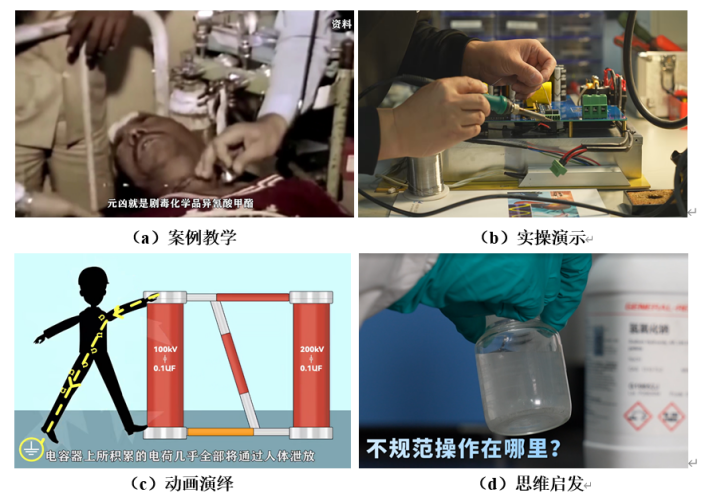University laboratories are the core sites for scientific research and talent cultivation, nurturing innovative sparks in cutting-edge topics and cross-disciplinary exploration. However, the research process carries both opportunities and risks. To enhance the safety awareness and skills of researchers, the Department of Electrical Engineering and Applied Electronics (EEA), in collaboration with the Laboratory Management Office of Tsinghua University, has recently officially launched a professional, comprehensive, and rich set of laboratory safety MOOCs on XuetangX.com. This course covers three levels of knowledge: general, specialized, and cross-disciplinary, encompassing subjects such as electrical engineering, chemistry, and biology. It provides safety education from various points of view, including value shaping, skill development, and knowledge transmission, offering safety education to students from different disciplines and grade levels as their first step before entering the laboratory.
Course Background
Tsinghua University boasts an exceptionally cross-disciplinary teaching and research environment. Taking electrical engineering as an example, the intersections between electrical engineering and disciplines such as chemistry, materials, biology, have become increasingly pronounced, leading to significant changes in experimental content. Electrical safety is one of the most common safety concerns across various experiments, while chemical and biological experiments carry greater hazards and a higher risk of accidents. For students with a background in electrical engineering, a lack of in-depth electrical safety training, or insufficient safety knowledge in cross-disciplinary fields like chemistry and biology, can result in increased experimental risks.
This problem of safety education resulting from cross-disciplinary learning is not exclusive to electrical engineering but also extends to students with backgrounds in mechanical engineering, energy, physics, and other fields. Therefore, this cross-disciplinary laboratory safety MOOC was developed to address this issue, providing in-depth safety training for students engaging in electrical experiments and offering comprehensive and user-friendly general courses in chemistry and biology safety for students lacking such knowledge.
Course Structure and Content
The course rejects the fragmented listing of knowledge and constructs a complete knowledge structure system. It emphasizes safety thinking and skill development, while integrating ideological education to deepen safety values.
The course adopts a modular structure to suit cross-disciplinary development. It is divided into three segments: general, specialized, and cross-disciplinary safety knowledge and skills. It also incorporates a safety culture component. Each segment comprises multiple topics that can be studied as standalone chapters, providing flexibility for students to choose their learning focus. The second and third chapters, covering electrical safety fundamentals and chemical safety fundamentals, are general courses and serve as compulsory content for both undergraduate and graduate students. The fourth to seventh chapters, covering specialized electrical safety courses, are mandatory for students before they engage in electrical experiments. The eighth and ninth chapters, addressing the intersection of electrical, chemical, and biological subjects, are available for students involved in relevant cross-disciplinary experiments. Through a comprehensive study of this course, students can master safety knowledge, develop safety thinking, and fully assume safety responsibilities.

Course Format
To make the course engaging and inspiring, it includes extensive real laboratory footage, rich animated demonstrations, diverse case studies, and interactive questions. The course’s real laboratory footage reflects students’ daily scientific research, encompassing not only EEA’s national key laboratories and experimental teaching centers but also laboratories from various units, such as the Department of Chemical Engineering, the Department of Chemistry, the Department of Physics, the School of Life Sciences, the Department of Thermal Engineering, the Academy of Arts and Design, the Basic Industrial Training Center, and more. Many students participated in the course’s filming. The course comprises 10 chapters and 64 sections, with accompanying exercises in each section to facilitate continuous learning.

Course Instructors
The course is guided by teachers with extensive teaching and safety management experience, including Professor Yu Xinjie, Party Secretary of EEA; Professor Wu Wenchuan, Deputy Secretary in charge of safety; Professor Zhu Guiping, Deputy Director in charge of teaching; Professor Wang Yujun, Director of the Laboratory Management Office at Tsinghua University; Professor Ai Desheng, Deputy Director of the Laboratory Management Office at Tsinghua University, and several safety experts.
The course is taught by instructors with professional safety and teaching experience. The general electrical safety and specialized electrical safety courses are taught by Chief Engineer Bi Daqiang, along with teachers such as Li Zhen, Qu Lu, Ma Ningning, and Gao Shengyou. The general chemical safety course is taught by Li Bingyang, a safety officer from the Laboratory Management Office. The cross-disciplinary content of electrical, chemical, and biological safety is taught by teachers involved in cross-disciplinary teaching and research who have achieved significant innovative results, such as Li Qi, Yi Chenyi, Lin Jin, Luo Haiyun, and others. Safety culture is taught by Professor Yu Xinjie, Professor Wang Yujun, and Professor Dang Zhimin, leaders of EEA’s academic development. Li Hang from the Tsinghua Sichuan Energy Internet Research Institute has provided materials for the course.

Commence the Course
Laboratory safety is not just a subject; it's a spirit, a responsibility, a tangible expression of a passion for science. Therefore, we extend a warm invitation to you here: let us use the safety course as a guide, safety thinking as a compass, to navigate scientific exploration together!
Course Link:
https://next.xuetangx.com/course/thu08291010083/17549660
Alternatively, scan the QR code below to access the course.


















 News & Events
News & Events